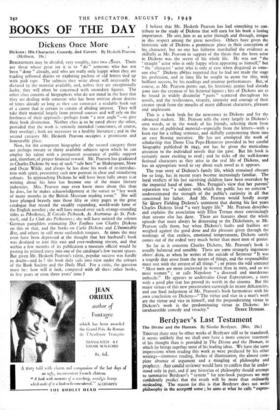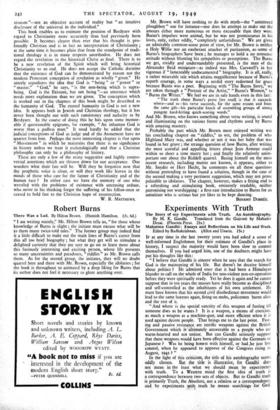Berdyaev's Last Testament
The Divine and the Human. By Nicolas Berdyaev. (Bles. 18s.) THOUGH there may be Other works of Berdyaev still to be translated, it seems unlikely that we shall ever have a more concise statement of his thought than is provided in The Divine and the Human, in which he brings together most of his leading ideas. We have the same impressions when reading this work as were produced by his other writings—immense reading, flashes of illumination, the almost com- plete absence of argument and a mingling of philosophy and prophecy. Any candid reviewer would have to confess that he under- stood only in part, and if any historian of philosophy should attempt to summarise Berdyaev's " system " for text-book purposes we may confidently predict that the result will be more than ordinarily misleading. The reason for this is that Berdyaev does not write philosophy in the accepted sense ; he aims at what he calls a expres-
sionism "—not an objective account of reality but " an intuitive disclosure of the universal in the individual."
This book enables us to estimate the position of Berdyaev with regard to Christianity more accurately than had previously been possible. It becomes clearer than ever that his thought is pro- foundly Christian and is in fact an interpretation of Christianity ; at the same time it becomes plain that from the standpoint of tradi- tional theology it is in many respects unorthodox. He does not regard the revelation in the historical Christ as final. There is to be a new revelation of the Spirit which will bring historical Christianity to an end. He does not accept the Catholic doctrine that the existence of God can be demonstrated by reason nor the modern Protestant conception of revelation as wholly " given." He utterly repudiates the idea that God is " being " or " power " or " master." "God," he says, " is the non-being which is supra- being. God is the Existent, but not being "—an utterance which needs more explanation than we are given. The conception which is worked out in the chapters of this book might be described as the humanity of God. The eternal humanity in God is not a new idea. It appears both in Jewish and Christian theology, but it has never been thought out with such consistency and audacity as by Berdyaev. In the course of doing this he hits upon some memor- able if questionable epigrams, for example, " An inhuman God is worse than a godless man." It need hardly be added that the judicial conceptions of God as judge and of the Atonement have no quarter from him. Perhaps the most interesting chapter is that upon " Messianism " in which he maintains that there is no significance in history unless we treat it cschatologically and that a Christian philosophy can only be a philosophy of history.
These are only a few of the many suggestive and highly contro- versial assertions which are thrown down for our acceptance. One wonders what their fate will be. Will they be forgotten now that the prophetic voice is silent, or will they work like leaven in the minds of those who care for the future of Christianity and of the human race ? In either case we have the memory of one who wrestled with the problems of existence with unceasing ardour, who never in his thinking forgot the suffering of his fellow-men or ceased to hold fast to the Christian hope of resurrection.
W. R. MATTttEWs.



































 Previous page
Previous page